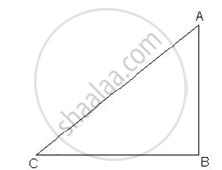Advertisements
Advertisements
Question
In the below given figure, a tower AB is 20 m high and BC, its shadow on the ground, is 20√3 m long. Find the sun’s altitude.

Solution
LetAB be the tower and BC be its shadow.
AB = 20, BC = 20√3
In ΔABC,
`tan theta= `
`tan theta=20/(20sqrt3)`
`tan theta=1/sqrt3`
`but,tan30=1/sqrt3`
`theta=30^@`
The Sun is at an altitude of 30º .
APPEARS IN
RELATED QUESTIONS
Without using trigonometrical tables, evaluate:
`cosec^2 57^circ - tan^2 33^circ + cos 44^circ cosec 46^circ - sqrt(2) cos 45^circ - tan^2 60^circ`
Prove the following identities, where the angles involved are acute angles for which the expressions are defined:
`((1+tan^2A)/(1+cot^2A))=((1-tanA)/(1-cotA))^2=tan^2A`
Without using trigonometric tables, evaluate :
`tan 27^circ/cot 63^circ`
Without using trigonometric tables, prove that:
cos 81° − sin 9° = 0
Without using trigonometric tables, prove that:
cosec 80° − sec 10° = 0
Without using trigonometric tables, prove that:
cos257° − sin233° = 0
Prove that:
`cos 80^circ/(sin 10^circ) + cos 59^circ "cosec" 31^circ = 2`
Prove that:
`sin 18^circ/(cos 72^circ )+ sqrt(3)(tan 10^circ tan 30^circ tan 40^circ tan50^circ tan 80^circ) `
Prove that:
\[\frac{\sin\theta}{\cos(90° - \theta)} + \frac{\cos\theta}{\sin(90° - \theta)} = 2\]
Prove that:
\[\frac{\sin\theta \cos(90^\circ - \theta)\cos\theta}{\sin(90^\circ- \theta)} + \frac{\cos\theta \sin(90^\circ - \theta)\sin\theta}{\cos(90^\circ - \theta)}\]
Prove that:
\[\frac{\cos(90^\circ - \theta)}{1 + \sin(90^\circ - \theta)} + \frac{1 + \sin(90^\circ- \theta)}{\cos(90^\circ - \theta)} = 2 cosec\theta\]
Prove that:
\[cot\theta \tan\left( 90° - \theta \right) - \sec\left( 90° - \theta \right)cosec\theta + \sqrt{3}\tan12° \tan60° \tan78° = 2\]
If A, B and C are the angles of a ΔABC, prove that tan `((C + "A")/2) = cot B/2`
Prove the following:
`1/(1+sin^2theta) + 1/(1+cos^2theta) + 1/(1+sec^2theta) + 1/(1+cosec^2theta) = 2`
`(sin 20°50' + tan 67°40')/(cos 32°20' - sin 15°10')`
The maximum value of `1/(cosec alpha)` is ______.
Prove that:
`(cos^2 "A")/(cos "A" - sin "A") + (sin "A")/(1 - cot "A")` = sin A + cos A
Prove that:
`(sin^3 theta + cos^3 theta)/(sin theta + cos theta) = 1 - sin theta cos theta`
